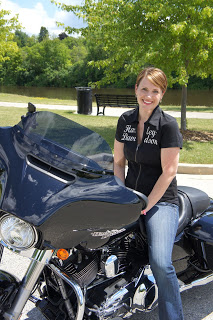Talea Lund, Industrial Engineer at Harley-Davidson

Talea Lund, Industrial Engineer at Harley-Davidson Powertrain Operations
#WiMHearHerStory | @WomeninMFG

At Women in Manufacturing, we are committed to supporting women in the manufacturing sector. We firmly believe that mentorship and community-building will help attract and retain women in manufacturing. As part of our mission, we feature on our blog the stories of women we admire who are currently working in manufacturing. The following is the latest installment of our "Hear Her Story" series.
Please tell our readers a little bit about your job and what your work looks like every day.
I am an Industrial Engineer at Harley-Davidson Powertrain Operations in Menomonee Falls, WI. Our group focuses on capital investment projects and supporting the operations group within the powertrain manufacturing facility. My work ranges widely, from supporting my co-workers’ projects, to systems support, capacity planning, workplace standards, ergonomic initiatives and process improvement projects. The best part of my job is that I support the entire plant, so I get to learn a lot every day.
How did you arrive at your current position? What attracted you to a career in manufacturing?
As I was working toward my Bachelors of Science degree in Industrial Engineering I obtained an internship at Harley-Davidson, and ended up working part time my senior year of college. Shortly before I graduated, I interviewed for a full-time Manufacturing Engineer position within the assembly department and got it. I moved around within assembly for two years and then took a position within the project group, which covers the entire plant.
My interest in manufacturing mostly stemmed from my childhood. My mother worked in manufacturing and it greatly increased our quality of life after my parents’ divorce. It showed me the impact manufacturing jobs have on the community. I also love being where things are made, and working in a fast-paced environment. In manufacturing, you can have direct hands-on experience and learn so much.
At WiM, much of our work is dedicated to refuting outdated stereotypes about the manufacturing sector: stereotypes like the workplaces are dirty and dangerous and that the field and skills required are a better fit for men. Have you encountered stereotypes like these in your education or career and how did you overcome them?
The facts are the facts, there are more men in this industry, and I saw that immediately when I entered engineering school. I never thought that it is a “better fit” for men versus women, but I do understand that it can be intimidating for a female to enter a male-dominated industry.
Manufacturing has evolved so much when it comes to keeping employees safe and providing quality work. In most cases, it is highly automated, clean and safe. According to the U.S. Bureau of Labor Statistics, the private manufacturing industry actually had a lower safety incident rate than the private health care industry in 2014. This shows the perception of danger in manufacturing is outdated.
One of the ways I work to overcome those stereotypes is by being involved in an event the local chamber of commerce organizes, the Manufacturing Career Expo. This event is aimed at educating junior high and high school students on the career possibilities within manufacturing.
Research shows that women, especially women in STEM fields, do better if they have a mentor. Has mentorship played any role in your career?
Formal mentorship has not played a role in my career. That being said, I have been beyond blessed to have many informal mentors/coaches who have helped me (and still do) along the way. This has been through informal meetings, career advice and helping me manage difficult situations. One of the key things to always keep in mind is that everyone knows something you do not, so you have the opportunity to constantly learn through others.
One of the key findings in WiM’s survey is that there is significant overlap between what young women want in careers and the attributes of careers in manufacturing today. But the survey also found that, too often, young women are not aware of the opportunities available in manufacturing. What do you think can be done to spread the word to women about career options in modern manufacturing?
Events like the Manufacturing Career Expo help tell women about their career opportunities. While this isn’t just focused on young women, it is focused on young people in general, and organizations should have a strong focus on reaching out to this next generation of employees.
I also think it is critical that organizations stay involved in their communities. Attending career days and supporting tech-ed programs are ways to help correct the perception of manufacturing and promote all of the wonderful opportunities. Many schools do not have well-developed tech-ed programs, so organizations should be focusing on sponsoring them to increase awareness of manufacturing.
We need to focus on parents! The reason many young women may not know about the opportunities is because their parents do not know, or their parents have an outdated perception of what manufacturing is and what it offers. There should be a focus on educating parents, because they have a tremendous influence on their children’s interests and what they are exposed to.
Our survey also found that the majority of women in manufacturing today would recommend the sector to young women considering career options. Would you recommend a career in manufacturing? And, if so, why?
Manufacturing careers are such a solid foundation for anyone, and I would argue all of the skills you learn in manufacturing are very transferable. Many manufacturing employers provide benefits like tuition reimbursement programs, generous paid time off and healthcare benefits.
Manufacturing is also very rewarding. Being around where things are made and where you can directly affect processes gives you information you may not get elsewhere.
Why did you decide to join Women in Manufacturing? How do you personally find value in WiM membership?
I decided to join Women in Manufacturing because it is an organization that does not focus on any one role within the industry; it’s for all roles that fall within manufacturing. I can network with anyone from human resource professionals to machinists. It’s the diversity within WiM that makes it so incredibly valuable. WiM’s publications and webinars significantly help me with my development.
